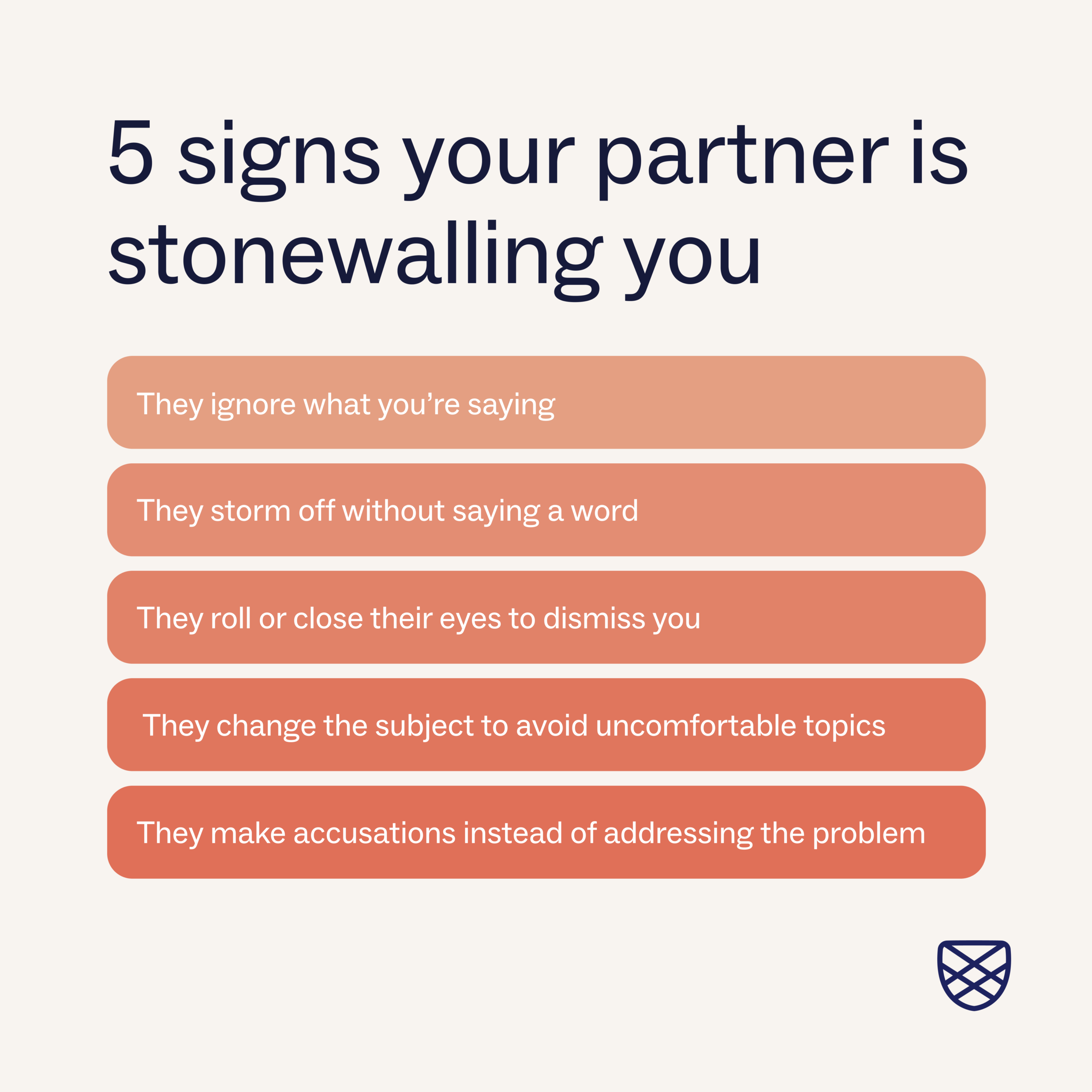
Table of Contents
Stonewalling Could Be Hurting Your Relationship

Written By: Ashley Laderer

Clinically Reviewed By: Dr. Don Gasparini
November 1, 2023
7 min.
Therapists explain what it means to stonewall, why it hurts relationships, and how to cope.
Learn more about our Clinical Review Process
Table of Contents
Have you ever been in the middle of a heated argument with your partner, and suddenly, they completely shut down? Maybe they refuse to talk to you, or they just walk away, leaving you hanging and wondering what’s going on.
If you’ve experienced this, you have been a victim of “stonewalling,” which is a frustrating-to-deal-with behavior that can come up when you’re trying to work through a conflict with your partner. Or, on the flip side, you might be the one who’s stonewalling.
Either way, it’s important to recognize when the behavior is going on and to understand why it happens. Keep reading to learn what stonewalling is, how it affects intimate relationships, and what you can do about it, according to therapists.

Learn how to build healthier relationships with Charlie Health
Skills-based therapy program for teens and young adults.
What is stonewalling?
The phenomenon of stonewalling means more or less putting a “wall” up between you and your partner, especially during times of conflict. “Stonewalling is a term used to describe the act of withholding communication, both verbally and non-verbally, during a conversation or argument,” says licensed clinical professional counselor Jamila Jones. “It is often seen as a form of emotional withdrawal, where one party is unwilling to engage with the other person.” (Yep, there’s that wall).
Stonewalling behavior can be intentional or unintentional, depending on the individual and the current circumstances. “You can think of stonewalling as emotionally checking out because you are so psychologically overwhelmed that your brain becomes hijacked, and you essentially go offline,” says licensed marriage and family therapist Dana McNeil. This is a case where unintentional stonewalling ensues.
The term is commonly used in the Gottman Method of relationship therapy. As a Gottman Method therapist, McNeil says this emotional overwhelm results in feeling flooded, leading an individual to “freeze,” similar to the biological trauma response of fight, flight, and freeze. “The person who is stonewalling has impaired mental functioning, is unable to have meaningful conversations, and often appears to outside observers to have metaphorically built a wall around themselves,” she explains.
On the other hand, intentional stonewalling occurs when one partner makes an active choice not to respond or engage in an effort to control or even punish their partner, Jones says. This is more common in toxic relationships where emotional abuse is present. Abusers may use stonewalling as a manipulation tactic that further feeds into the cycle of emotional abuse, which (unsurprisingly) can take a huge toll on mental health.

Yes, Being in a Toxic Relationship Affects Your Mental Health—Here’s What to Do
Charlie Health Editorial Team
What is an example of stonewalling in a relationship?
Still not sure if you could be stonewalling your partner or if you are being stonewalled? Below are a few examples of stonewalling behavior. Again, these behaviors can be intentional or unintentional –– but regardless, stonewalling can hurt your relationship. Here’s what stonewalling may look like in a relationship:
- Walking away in the middle of an argument
- Tuning out during a difficult conversation
- Giving short answers when having an important discussion
- No eye contact or making minimal eye contact during a difficult conversation
- Not responding to what a partner is saying
- Being willing to engage with other people around (such as your children) but not with each other
- Shutting down specifically during certain topics that are hard to talk about

What effect does stonewalling have on a relationship?
Stonewalling is serious. The Gottman Method labels stonewalling as one of the “Four Horsemen,” which refers to the four communication patterns that can potentially predict the end of romantic relationships. McNeil says the other three “horses” are criticism, defensiveness, and contempt. If The Four Horsemen are showing up in your romantic relationship, it doesn’t mean your relationship is completely doomed, but it certainly isn’t a good sign.
“When we stonewall, we block all communication and shut the other person out. This leads to feelings of loneliness, frustration, and even anger,” Jones says. “It prevents us from dealing with issues and instead allows them to fester.” As you can imagine, not openly communicating about the issues at hand will not allow you to progress in your relationship –– and brushing problems under the rug is never a good idea.
So, what is the effect on the person being stonewalled? “To be on the receiving end of stonewalling can be misinterpreted as a lack of care or concern,” McNeil adds. “If the stonewalling partner walks away in the middle of the conversation without acknowledging when they will come back or even if they are going to return to resolve the issue, the other person may end up feeling abandoned, unloved, or the like they’re the only one who cares about resolving the issue.”
Since open, healthy communication is key to the success of romantic relationships, stonewalling behavior hinders this fundamental aspect of a healthy relationship. Plus, it can lead to a vicious cycle of more and more stonewalling behavior and unhealthy communication.
Can a relationship experiencing stonewalling be saved?
It’s clear that addressing and overcoming stonewalling is imperative if you want to build a strong and enduring relationship. “Over time, stonewalling can lead to a total breakdown in the relationship,” Jones says. “It’s important to recognize when we are stonewalling and make an effort to open up and communicate with our partner. By doing so, we can strengthen our relationship and avoid the damaging effects of stonewalling.”
So if you, your partner, or both are stonewalling, all hope is not lost. It is possible for the relationship to be saved –– however, it will require some hard work. Here are four therapist-approved tips for dealing with stonewalling in a relationship.
1. Get vulnerable and honest
When working through conflicts, it isn’t always easy to be vulnerable. However, to build emotional intimacy, vulnerability, and honesty are crucial. Jones suggests the following for creating a safe space for vulnerability with effective communication:
- Express concerns specifically during times of conflict
- Make an effort to be an active listener
- Validate each other’s emotions as you communicate
- Highlight feelings over accusations
- Use “I feel” statements instead of “You did” statements
If communication struggles are an ongoing problem in your relationship, you may want to consider couples therapy.
2. Let your partner know if you need a break
When you’re feeling emotionally overwhelmed and completely flooded, it’s a good idea to take a break. Let your partner know this rather than simply just walking away. “Determine how you will let your partner know when you are overwhelmed and need a break,” McNeil says. “Take a break for at least 20 minutes but no longer than 24 hours. Let the other person know when you will return to discuss the issue with a level head.”
You can tell your partner you need to soothe your emotions with the intent of regaining a positive perspective so that you can resolve the conflict in a caring and sensitive way, she says.
3. Know your coping skills
When emotions are running high and you feel paralyzed, it helps to know what works for you. You can use these coping skills during your break. McNeil suggests identifying a few things that are your go-to tools for calming down and grounding yourself, which can be as simple as going for a walk, doing some gardening in the yard, or watching a funny comfort show.
The goal is to be able to use this skill so you can reset your emotions and then return in a better mindset to work through conflict and communicate with your partner effectively.

4. Remind yourself that conflict doesn’t have to ruin your relationship
Every couple argues from time to time –– it’s only natural. Negative emotions are going to pop up here and there. “Many couples experience conflict, and it doesn’t mean the relationship is doomed,” McNeil says. “It might just mean that a temporary compromise needs to be found. Remind yourself that you love this person and that accepting your differences is part of the work of being in a relationship.”
You may also want to remind yourself of the positives of the relationship and everything you love about your partner so that your judgment is not completely clouded by the negative. However, this is not the case for abusive relationships, which are unsafe to stay in. While it can be very hard to leave an abusive relationship, this isn’t a time to make excuses for your partner’s abusive behavior.
How Charlie Health can help
Dealing with relationship struggles isn’t easy. If you feel like your mental health is struggling and putting a strain on your partnership, or if you feel like your relationship is harming your mental health, Charlie Health may be able to help.
Our virtual Intensive Outpatient Program (IOP) provides personalized mental health services for teens, young adults, and families dealing with many different struggles. All of Charlie Health’s clinicians are trauma-informed, non-judgemental, and well-equipped to help you cope with whatever challenges life throws your way. Therapy can also help you determine whether you are in a toxic relationship or if you’re a victim of abuse –– and then provide guidance on where to go from there.



